By Mikaela STONE
Central Park Pasadena found itself with oodles of poodles (and poodle enthusiasts) on Sept. 24 for MobilityDog’s Poodle Palooza. MobilityDog is a volunteer-run, standard poodle-focused nonprofit that works to normalize disabilities and provide independence for those struggling with mobility issues. This is done by providing service dogs and a welcoming community.
Poodle Palooza helps to introduce the public to MobilityDog as well as to provide education about the importance of service dogs, information on service dog etiquette and fundraise for the dogs. From start to finish, it takes an estimated $30,000 to turn each poodle puppy into a perfect companion. Donations help prevent the entire financial burden from falling on the service dog’s human companion and keep MobilityDog running. Thirty-two poodles, both service dogs and service dogs in training, are supported through the nonprofit currently, 13 of which showed up for the Palooza with their handlers. Also there to offer support were Pasadena Fire Station 37, the Los Angeles County Commission on Disabilities, NeuroSport Physical Therapy, which led the volunteers in stretches during the pre-event, and Farm Fresh To You, which is a disability-friendly shopping option. Those who arrived to support MobilityDog could do so by purchasing merchandise tickets to an opportunity drawing that had prizes that ranged from an electric bike to a box of groceries. For those who missed out on the merchandise but still want a poodle centered T-shirt or tote bag that benefits a good cause, they can be found on mobilitydog.org alongside useful information about the nonprofit and ways to get involved.
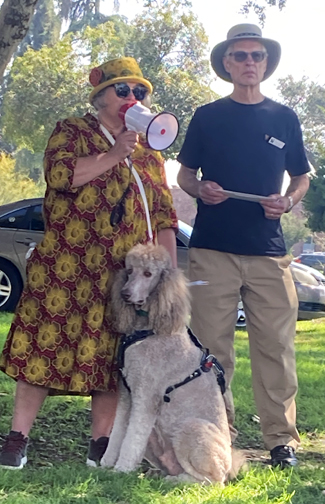
At Poodle Palooza the most requested types of donations were that of time and offering one’s home as a puppy-raising residence. Puppy raisers keep poodle puppies for the first 15 months of their lives, providing them with socialization and basic training before turning them over to advanced trainers. Kathy Makshanoff, a longtime puppy raiser, has so far raised and given up 17 puppies. She said she has found the experience to be one of the most rewarding in her life and encourages others to follow in her footsteps.
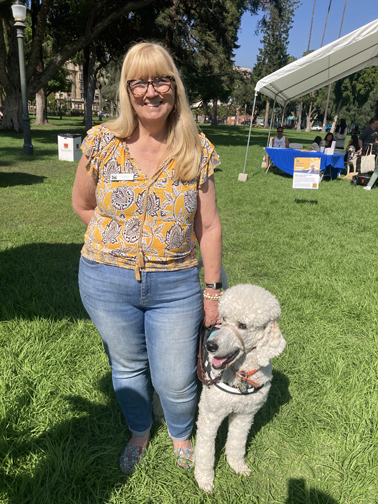
While she acknowledged the emotional difficulty of giving up a puppy after 15 months, she said of puppy raising, “If you think you can, you can.” She added the first 10 months are the most important in the lives of puppies and they need good people willing to sacrifice their time and love to make certain that someone can have the companion and aid they need.
The Palooza also offered a booth for DIY dog painting complete with multiple masterpieces made by the poodles present. To accomplish these masterpieces doggie painters were given a plastic baggie with a canvas and paint inside and peanut butter on the outside. As they licked up the peanut butter, the paint was spread into unique patterns – an enjoyable experience for dog and human alike. Brady Helm, who manned the paint booth with his poodle Yogi, was happy to discuss his experiences with MobilityDog. As a tall man concerned with the learning curve involved with relying on a dog, he found that standard poodles were the perfect match.
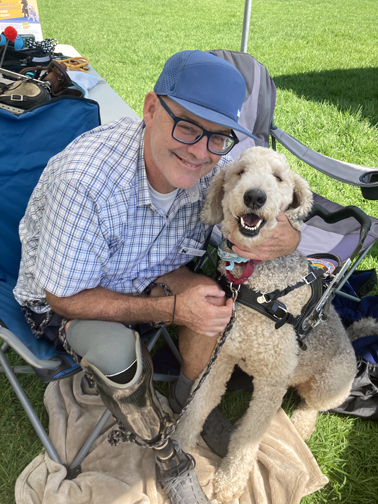
Struggling with a spinal injury, Helm was tired of falling. After noticing the difference a seeing eye dog made in his brother’s life, he turned to MobilityDog. MobilityDog trainers matched Helm with Yogi because of the dog’s sturdiness and height. Yogi won his handler’s heart in no time; Helm remarked that “poodles bond strongly.”
Poodles may not be the first breed one thinks of when considering a stereotypical service dog. However, as the second smartest existing dog breed after border collies with a relatively manageable energy level, hypoallergenic hair that does not shed, and a sweet temperament, poodles for many are the perfect choice.
The poodles’ correlation with adoration by French nobility and pampering, most notably King Louis XVI who converted his billiards room into a bedroom for his poodles and named the breed the national dog of France, have given the dog the stereotype of being prissy and precious about their hair; however, they started their existence not as lap dogs but as hunters. In fact, the cliché “poodle haircut” originates from their original classification as a sporting breed. They were first bred to hunt ducks in frigid German waters, specialized with webbed paws and thick hair to keep them warm. Too much hair, however, risks dragging the dog down. The solution was to leave poofs of hair around the dog’s joints and vital origins – and thus the poodle cut was born out of functionality.
Though a poodle’s cut now remains up to the owner, as any poodle owner will affirm poodles work and play just as hard as any other dog. Anna Gilnetz, MobilityDog’s lead trainer, added that “poodles are fun and great but when it’s time to work, it’s time to work.”
Poodles are inclined to agree; the chief complaint against the poodle is their susceptibility to boredom should they not be provided with the proper stimulation; however, becoming a working breed eliminates boredom almost entirely.
Gilnetz’s job is to teach the poodles specialized functions necessary for being mobility companions before placing the dogs with their forever person once they reach the necessary maturity of 2 years of age. Part of the purpose of Poodle Palooza was to honor crucial members of MobilityDog like Gilnetz and puppy raisers for their work in the service poodle community.
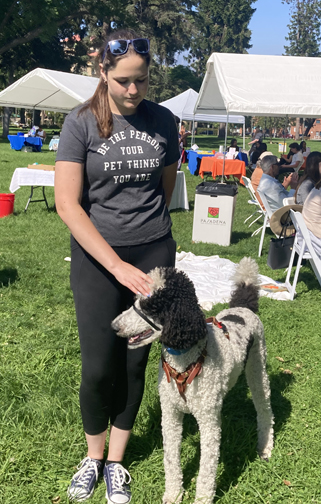
The community built around MobilityDog is close-knit, as Helm confirmed. Members talk regularly over Zoom and meet up once a month in person. A common meeting spot is Huntington Beach where they bring their dogs to meet up with members of Ramp It Up who provide handcycles for those with better mobility in their arms. With puppy raisers needed, they are hoping to expand that community even further.
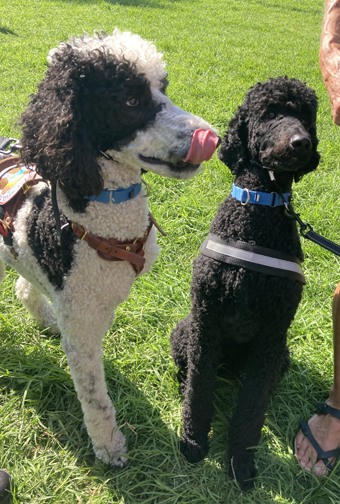
As volunteer Aiko Tan said, “In the middle of the word ‘community’ is unity.” Fighting disability stigma is a job that needs everyone on board, regardless of ability status. What better tool to do so than poodles?
